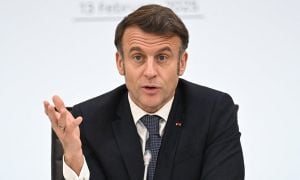The Russia-Ukraine conflict, now entering its fourth year, is witnessing intensified discussions surrounding potential peace negotiations. U.S. Special Envoy Steve Witkoff recently shared insights on CNN, stating, "This conflict should not have happened. It was provoked. But it was not necessarily provoked by Russia." His comments highlight the complicated nature of the conflict, which has seen significant escalations and territorial changes since its inception.
During the same period, Witkoff emphasized the importance of the Istanbul agreement, where Ukraine and Russia had nearly reached a resolution back in February 2022. He noted, "We are very, very close to signing something." This agreement had hinged on Ukraine's commitment to remain neutral and forgo NATO membership, establishing limits on their military capabilities. Yet, with Russia's annexation of four Ukrainian territories, the dynamics have shifted dramatically.
Another key figure, Russian Foreign Minister Sergey Lavrov, insisted on the necessity of achieving sustainable outcomes before Russia would halt its military actions. While visiting Ankara on February 24, Lavrov stated, "We are ready to negotiate with Ukraine, with Europe, with any representatives who want to help achieve peace on good terms." His remarks reaffirmed Russia’s readiness for dialogue, albeit with the expectation of results favorable to Moscow.
Likewise, Russian Deputy Foreign Minister Sergey Ryabkov expressed concerns during interviews, emphasizing the risks associated with pursuing only ceasefire agreements. "A ceasefire without a long-term solution will lead to resumption of fighting, with even more serious consequences," he cautioned. Ryabkov highlighted the imperative for negotiations to address the underlying causes of the conflict, insisting on the need for durable peace frameworks.
From the Ukrainian perspective, President Volodymyr Zelensky recently outlined complex negotiations with the U.S., voicing concerns about potential pitfalls. According to him, the latest proposals from American counterparts resemble more of a means to repay debts rather than truly facilitating supportive investments. Zelensky remarked, "The latest terms resemble more of a means to repay debt rather than to encourage investment," showcasing the apprehensions from Kyiv about their long-term autonomy and stability.
The conversation around Ukraine's security and military aid from the U.S. is particularly pertinent, as there are fears in Kyiv of diminished support. Witkoff's comments hinted at added pressure, noting how Ukraine could see funding constraints impacting military access and technological support such as Starlink, following negotiations.
While the U.S. seems eager to facilitate peace, the paths taken to achieve this end are riddled with complications and mistrust. Lavrov's commendation of the U.S.'s cautious approach reflects Russia's strategic intention to secure terms more aligned with its positions without compromising its military objectives. Conversely, the discourse within Ukraine suggests trepidation about concessions considered during peace talks, which could undermine its sovereignty.
Reflecting on these developments, negotiating peace remains incredibly challenging, with entrenched positions on both sides. The need for dialogue is urgent, yet the outcomes hinge on aligning deeply diverging national interests and historical grievances. The stakes could not be higher for both nations, as the world watches the evolution of this conflict and its broader implications on global stability.
Negotiations stand as both hope and challenge, with Witkoff's assertion of nearing agreement juxtaposed against Lavrov and Ryabkov's firm stances on sustainable terms. The next phase of discussions will be pivotal, as both Russia and Ukraine grapple with their future, and the specter of conflict looms large over Europe.



